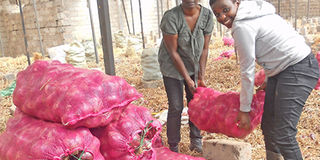I count my money from onions, one bulb at a time

Lucy Wangari (in white jacket) and her workers at her farm in Ndeiya, Kiambu County. PHOTO|WAIGWA KIBOI|NMG
What you need to know:
- She started the onion agribusiness by experimenting on an eighth of an acre and expanded after realising the crop was better paying.
- To plant the crop, she mixes seeds and sand in a ratio of 1:3. The beds are then thoroughly mixed with goat manure. Shallow furrows of about 3 inches are done.
- The challenges associated with onion farming include weeds, pests and diseases like purple blotch and downey mildew.
A drive to Ndeiya on the outskirts of Limuru Town is smooth, thanks to a well-tarmacked road that connects the region to the capital Nairobi.
The smooth ride, however, ends at the trading centre, with a rough road taking us to Veteran Farm, our destination.
The farm, run by Lucy Wangari, hosts thousands of onion crops at various stages of growth, all grown under irrigation.
The crop farmed on blocks of one acre sprawls on a total of ten.
“We plant the crops in blocks at different times so that we harvest an acre every month. We have tenders to sustain throughout the year and the market trend determines the space on which we grow the crop,” says Lucy, a 2016 Land Resource Planning and Management graduate of Jomo Kenyatta University of Agriculture and Technology.
Lucy says she started onion production in 2017, though her family has been growing various crops on the land that they own.
The farm produces up to 20 tonnes of onions every month, which helps them break even, including enabling them to cater for the salaries of their 10 permanent staff, says Lucy, adding they sell each kilo at between Sh60 and Sh100.
She started the onion agribusiness by experimenting on an eighth of an acre and expanded after realising the crop was better paying.
“This was after I returned from Israel where I went to study for a one-year post graduate diploma in advanced agriculture. In Israel, I got more practical knowledge in farming by working for at least 12 hours every day.”
She put into practice what she learnt in Israel, first starting with training her workers on aspects of drip installation and irrigation, selection of seeds, nursery management, spacing and identification of pests and diseases and their control.
“I also taught them about postharvest management of onions,” says the farmer, noting she has ensured the workers practice all that she teaches them for better harvest.
Every season, she says, she sits together with the workers to plan for the year, which is broken into weeks and months before they set targets.
“We also engage in a lot of research and it is all about teamwork. We have identified talent of each individual which we tap when need be. For example, the person who is good at irrigation becomes the team leader during that session.”
According to her, onion farming is a game of numbers. “It is not the size of your land that matters but the production per unit area. When crops are grown per unit area, you not only maximise land use but also production,” she says, adding an acre hosts 200,000 Neptune onion crop variety.
To plant the crop, she mixes seeds and sand in a ratio of 1:3. The beds are then thoroughly mixed with goat manure. Shallow furrows of about 3 inches are done.
“The mixture is gently placed on the furrows and lightly covered with soil. This is then covered with sisal bags. Watering is done daily. The seeds sprout on the seventh to tenth day. They are then uncovered and the crop takes 45 days to mature,” she offers.
Onions require a spacing of 7.5cm, she says. “They are heavy feeders thus require a lot of manure and water. Always ensure you have a weed-free field because onions don’t like competition. A soil test should be done every season to check on the soil health.”
Besides Ndeiya being a dry area, Lucy turned to drip irrigation mainly to boost production.
“Drip irrigation ensures the crop gets good amount of water and where needed — at the roots. This is the science behind the technology that was invented in Israel.”
Irrigation water is not a problem on the farm as she has dug a 365-metre deep borehole that is powered by 35 solar panels saving her costs.
The water is pumped into 12 water tanks that hold 10,000 litres each before it flows to the farm by gravity.
But it is not all rosy. “There is a time we lost a produce worth Sh800,000 due to poor post-harvest practices,” she recalls.
Lucy is eying the export market, noting sometimes the Kenyan market is flooded by imports from Tanzania, Ethiopia and Southern Sudan.
“It is all about quality market, if price is better outside the country, why not sell there?” says Lucy, who sells the produce to supermarkets, hospitals and learning institutions.
Jeremiah Thuku, an agricultural consultant with Osho Chemicals, says the onion crop is a heavy feeder crop which requires a lot of manure. “Soil analysis is mandatory to determine nutritional and pathology status in that soil. Crop rotation is a must for a farmer to be successful.
The challenges associated with onion farming include weeds, pests and diseases like purple blotch and downey mildew.



